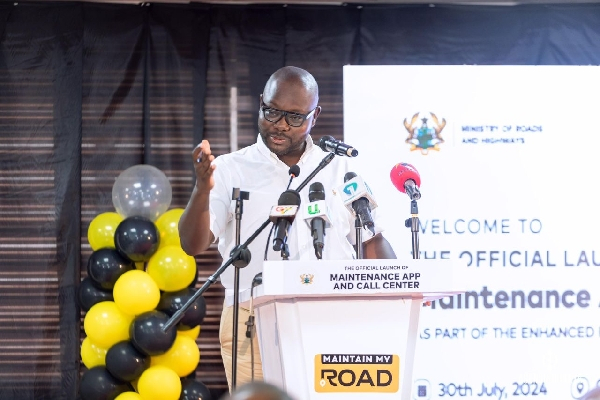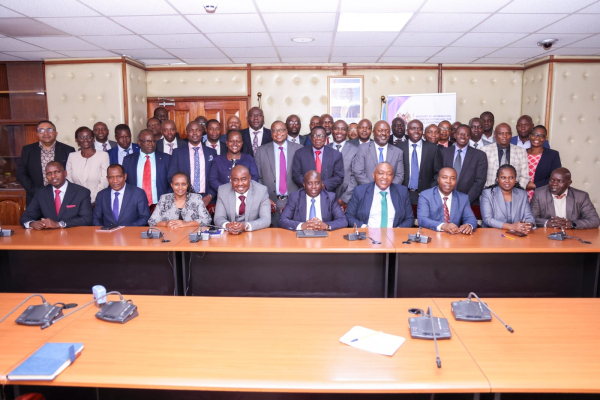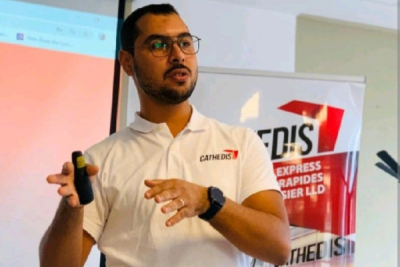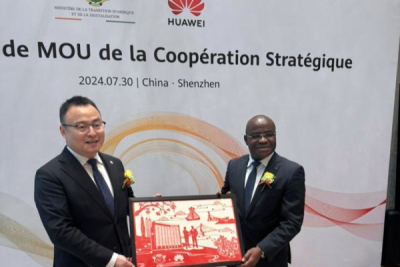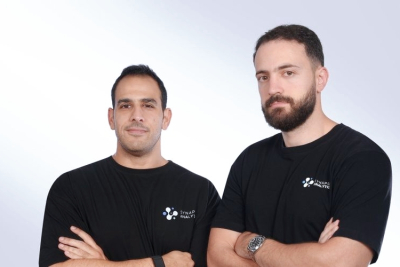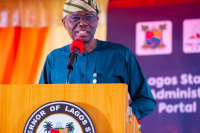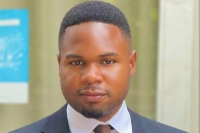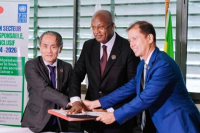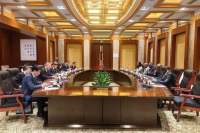In 2023, Ghana officially recorded 11,694 road accidents. To reduce that number, authorities are turning to advanced technologies.
On July 30, the Ghanaian Ministry of Roads and Highways announced the launch of a mobile application called "Maintain My Road." This app will allow citizens to report road issues, aiming to enhance road safety and infrastructure.
The pilot phase, spanning five months, targets major roads in four key cities: Accra-Tema, Kumasi, Takoradi, and Tamale. "The accessibility provided by a well-maintained road system enhances tourism by connecting visitors to key attractions, generating revenue, and creating jobs in the hospitality sector," stated Francis Asenso-Boakye, Ghana’s Minister of Roads and Highways.
Between January and October 2023, the National Road Safety Authority (NRSA) recorded 11,694 road accidents in the country. In response, authorities have implemented advanced technology using cameras and sensors to detect and penalize traffic violations such as speeding and running red lights. The launch of "Maintain My Road" is part of this broader initiative.
Additionally, a call center has been established with the same objective. It operates Monday through Friday from 8 AM to 5 PM, with customer service representatives fluent in several local languages, including Twi, Ga, and soon Hausa.
Adoni Conrad Quenum
Information and Communication Technology (ICT) is key to the Kenyan government's socioeconomic development strategy. To achieve its ambitious goals, the country is enlisting the expertise of experienced professionals to guide its efforts.
On Monday, July 29, the Kenyan government announced the recruitment of 46 ICT directors who will be assigned to various ministries and state departments. These ICT leaders are expected to utilize their skills and expertise to create job opportunities for young, unemployed Kenyans.
The 46 engineers, appointed as part of an ongoing government reshuffle, will focus on enhancing service delivery to citizens and developing the digital economy.
"Their diverse expertise in Research and Digital Innovation, Software Development, E-commerce and Entrepreneurship, Cybersecurity, and Systems Audit and Control will be instrumental in advancing the Ministry's mission to build an informed and digitally empowered Kenyan society," said John Kipchumba Tanui, Principal Secretary of the State Department for ICT and Digital Economy.
This recruitment initiative is part of the Kenyan government's broader strategy to generate digital jobs for youth through the digital highway and creative economy, which are key components of the Bottom-Up Economic Transformation Agenda (BETA). This agenda serves as a crucial catalyst for other economic pillars, aiming to boost investments in sectors vital for economic growth and household well-being.
The newly appointed directors will work diligently to help the government achieve its ambitious digital objectives. Their contributions are expected to enhance administrative efficiency, improve public service delivery, strengthen digital infrastructure, and drive economic growth through digital transformation initiatives.
For the 2024/2025 fiscal year, the Kenyan executive has allocated approximately $125.3 million to ICT sector projects, marking a significant increase from the $108.4 million designated for the 2023/2024 fiscal year.
Samira Njoya
An IT specialist by training, he helps African online retailers streamline their parcel delivery process. His digital solution accelerates and simplifies the shipping of goods.
Imad El Mansour Zekri(photo) is a Moroccan IT specialist and tech entrepreneur, serving as the founder and CEO of Cathedis, a tech startup focused on parcel delivery for e-commerce businesses.
Established in 2015, Cathedis provides a fully digital logistics platform designed to cater to consumer needs. The company offers services such as delivery options, online or cash-on-delivery payments, and real-time tracking of parcels and delivery personnel. Cathedis aims to digitize and automate the centralization and distribution of parcels across Africa.
"We offer a fully digital delivery solution that includes pickup from stores, order processing, physical delivery, proof of delivery, and funds return," Zekri explained in 2020.
Zekri holds a specialized technician diploma in IT management, which he obtained in 2008 from Pigier School in Morocco. He also earned a master's degree in systems engineering, networks, and security in 2011 from the Faculty of Science and Technology at Hassan 1st University in Settat, Morocco.
To build his expertise, Zekri began his career in 2010 as a technical sales engineer at AGT Maroc, a company specializing in the integration of IT and telecom networks. In 2015, he transitioned to Integradis Europe, where he continued as a technical sales engineer, focusing on IT development and digital services.
Melchior Koba
He is a digital transformation expert who helps businesses succeed. He provides data collection and marketing tools specifically designed for e-commerce entrepreneurs.
Bashanganyi Magwape (photo) is a Botswanan computer scientist and serial entrepreneur. Co-founder and CEO of Meeticks Africa, he provides businesses with the tools, access, and support they need to thrive.
Founded in 2020 by Bashanganyi Magwape and Ismael Camara, Meeticks Africa helps small businesses source supplies, digitize their operations, and expand their customer base. Its mission is to "unlock value in Africa's informal communities and markets through online commerce."
One of Meeticks Africa's key innovations is a WhatsApp chatbot that enables e-commerce merchants to reach more customers across the country. This solution simplifies inventory management, orders, restocking, and accounting digitally.
In 2022, Meeticks Africa launched Jaabi, an innovative technology that allows users to collect data for surveys, market research, and subscription forms. Utilizing the WhatsApp Business API, Jaabi makes data collection more accessible and efficient.
The startup also offers an entrepreneurship program called DoDigi. The goal of this program is "to train, upskill, and economically support 3,000 women entrepreneurs in Southern Africa over the next three years," stated the CEO of Meeticks Africa in 2022.
Bashanganyi Magwape is a digital consultant for the Dream Factory Foundation, an organization aimed at empowering youth through education. He holds a degree in computer science obtained in 2006 from the Botswana Accountancy College (BAC). He also has a degree in sound engineering (2008) from CityVarsity School of Media and Creative Arts in South Africa.
In 2008, the entrepreneur worked as a music solutions assistant at Mama Dance, a music platform. From 2013 to 2021, he was the director of Youngpreneurs Media, an audiovisual content creation company. Between 2018 and 2023, he served as CEO of Basha Consulting, a company specializing in digital transformation.
Melchior Koba
Côte d'Ivoire and China have maintained strong bilateral relations across various fields for several decades. Recently, the two countries decided to strengthen their cooperation in the digital sector.
Chinese tech firm Huawei will train 1000 Ivorians by 2035– at the rate of 100 yearly– in digital skills. This initiative stems from a memorandum of understanding signed on Tuesday, July 30, between the Ivorian Ministry of Digital Transition and Digitalization and Huawei, on the sidelines of the China-Africa Digital Cooperation Forum recently held in Beijing, China. Training will cover areas such as data center management and cybersecurity.
"China has made significant technological advancements. It is crucial for us, African countries aiming for acceptable development levels, to pursue enhanced cooperation with them," stated Ibrahim Kalil Konaté, the Ivorian Minister of Digital Transition and Digitalization.
The partnership aligns with the objectives of the China-Africa forum to deepen digital cooperation between the two parties. It follows a meeting a few months ago between Terry He, Huawei's president for the Africa region, and Ibrahim Kalil Konaté in Abidjan. During this March meeting, the Chinese tech company reaffirmed its commitment to support Côte d'Ivoire in achieving its digital projects.
This new partnership will benefit Côte d'Ivoire, which launched the construction of its national data center, the largest in West Africa, in December. This Tier 3 certified facility will cover an area of 20,000 square meters and boast an impressive capacity of 220,000 terabits.
The training is expected to enhance local expertise in managing this national asset and support the country's digital development by offering growth and innovation opportunities. Côte d'Ivoire aims to become the digital hub of West Africa by 2025.
Samira Njoya
Egyptian AI startup Synapse Analytics has secured $2 million in new investment to expand its AI-powered solutions across the Gulf Cooperation Council (GCC) and Africa, focusing on the financial sector. The investment was led by venture capital firm Silicon Badia and Hub 71, Abu Dhabi.
Synapse Analytics partners with Amazon Web Services (AWS) and Crealogix, offering digital banking and application processing software. As part of Hub71, the company addresses financial inclusion by offering AI software for credit scoring, cross-selling, dynamic pricing, and eKYC/eKYB processes.
The expanding digital economy in Africa is creating new wealth, prompting many governments to view it as a fresh source of revenue. In response, they are intensifying tax reforms to effectively capture this growing economic sector.
The Lagos State Government has unveiled an ambitious strategy to generate an additional N200 billion ($120.4 million) annually from the digital sector. This initiative includes the introduction of taxes targeting remote workers, foreign companies, and digital influencers. To facilitate this, the government plans to develop a Resident Global Digital Citizen Tax Management System.
The budget for this digital taxation initiative is estimated at N250 million ($147,000). It aims to capture revenue from approximately two million digital economy participants. This system will include the accreditation and licensing of digital economy operators, supported by an e-portal, a Marketplace, and a Recovery Platform.
The initiative to boost tax revenues from the digital sector is a key element of Lagos State's strategy to achieve N5 trillion ($2.94 billion) in Internally Generated Revenue (IGR). This plan is outlined in the EKO Revenue Plus Summit synopsis document, with the summit set to take place on September 25-26, 2024. The event will focus on exploring new revenue streams under the theme “Unlocking New Revenue Streams for Lagos State.”
In addition to the new tax measures, the Lagos State Government is also planning various investments to boost the digital sector's contribution to local finances.
Digitalization of Government Services and Data Monetization: Lagos State plans to develop a public data marketplace to license and monetize data from various government services. This initiative is expected to cost N500 million ($294,000) and potentially generate N50 billion ($29.4 million) per year.
Lagos State Fintech Hub: The state plans to establish a fintech hub to support digital payments, mobile money, lending, and crowdfunding. The projected budget is N5 billion ($2.94 million), with an estimated annual revenue of N100 billion ($58.8 million) from vendor transaction fees and platform services.
Lagos State Software Development Center: This targets a new hub focused on developing software solutions for finance, SMEs, and retail sectors. With a budget of N500 million ($294,000), the initiative aims to generate N150 billion ($88.2 million) annually from subscriptions and service fees.
Lagos State Digital Economy Acceleration Hub: This initiative involves selecting and developing 100 innovative startups through a hackathon and subsequent support, with an estimated cost of N12 billion ($109.2 million) and expected revenue of N100 billion ($58.8 million) per year from profit-sharing models.
Lagos State Advertisement Network: The creation of a state-owned advertisement network and approval management platform is anticipated. With a budget of N500 million ($294,000), the projected annual revenue is N15 billion ($8.82 million) from income fees and permits.
Blockchain and Tokenization Agenda: Lagos State plans to implement tokenization for real estate, infrastructure, and intellectual property. This project will require N500 million ($294,000) and aims to generate N100 billion ($58.8 million) annually from income fees and permits.
Collaboration with FGN on Digital Service Tax (DST): The state plans to work with the Federal Government to implement DST, generating revenue from global digital platforms operating in Nigeria. This collaboration has a budget of N750 million ($441,000) and is projected to bring in N50 billion ($29.4 million) annually.
This comprehensive approach underscores Lagos State's commitment to leveraging technology and innovative revenue mechanisms for substantial financial growth. In Q4 2023, Nigeria’s Information and Communications Technology (ICT) sector made a significant impact on the country’s economic performance, contributing 16.66% to the real Gross Domestic Product (GDP), according to the National Bureau of Statistics (NBS). This substantial contribution highlights the increasing importance of the ICT sector in Nigeria's economy and its vital role in driving economic growth and stability.
Hikmatu Bilali
In 2015, he left Cameroon for the Democratic Republic of Congo, where he earned his doctorate in medicine. Passionate about technology, he developed an innovative application that allows patients to easily locate nearby pharmacies and purchase medications.
Ulrich Kouesso is a Cameroonian entrepreneur and expert in preventive medicine. He co-founded LukaPharma in the Democratic Republic of Congo (DRC), where he serves as CEO. Established in 2021 alongside Christian Kouesso and Charlotte Nsongo, LukaPharma aims to enhance access to quality medications through digital solutions. The startup offers a mobile application that enables patients and caregivers to quickly locate the nearest pharmacies with the required medications. The platform connects users with pharmacies, allowing them to compare medication prices, pay remotely, and arrange for delivery. This service helps prevent complications from delayed medication intake and reduces healthcare costs.
LukaPharma exclusively partners with pharmacies owned by licensed pharmacists recognized by the National Order of Pharmacists of the DRC. To date, the company has over 40 partner pharmacies in Kinshasa.
In addition to his role at LukaPharma, Ulrich Kouesso works as a freelance consultant in medical data collection. In 2019, he launched My Virtual Planning, a digital sexual education platform aimed at reducing unwanted pregnancies. This platform assists with pregnancy and menstrual cycle tracking, as well as family planning, and earned the Orange Social Entrepreneur Prize in 2020.
Kouesso moved to the DRC from Cameroon in 2015, holding a public health degree from the University of Dschang. He graduated from the Bel Campus Technological University of Kinshasa with a doctorate in medicine in 2021. From December 2021 to January 2022, he served as a consultant for the Ishango Startups Center in the Healthtech Meetup program.
In 2022, Ulrich Kouesso received the Best Start-up of the Year award from the Federation of Congolese Enterprises for LukaPharma. In May 2024, he participated in GITEX Marrakech in Morocco.
Melchior Koba
Gabon is currently one of the African leaders in the development of information and communication technologies (ICT). With the support of strategic partners, the country is undertaking the digitization of its judicial sector.
Gabon has obtained a ¥331 million (about $2.2 million) grant from Japan to modernize its judicial sector through digital technology. According to a release, dated Junly 29, from the justice ministry, the project will be carried out in partnership with the United Nations Development Programme (UNDP).
“This is a process we began with a symposium last November. The signing of this aid agreement will allow us to achieve our goals for the justice system in our country,” Justice Minister Paul-Marie Gondjout (photo, center) said.
The initiative aligns with Gabon’s “Gabon Digital” strategy, which aims to establish the country as a Central African hub for the digital economy. In June, the government approved a €56.2 million ($61 million) loan from the World Bank to finance the broader strategy.
Gabon ranked 10th among African countries with a score of 74.7 out of 100 in the 2024 ICT Development Index published in the "Measuring Digital Development: The ICT Development Index 2023" report by the International Telecommunication Union. This score improved from 72.9 in the 2023 edition of the report.
Adoni Conrad Quenum
Since the COVID-19 pandemic, many African nations have accelerated their digital transformation efforts. Recognizing the challenges inherent in this process, China is committed to supporting these countries in achieving a unified and cohesive digital future.
On Monday, July 29, China and 26 African countries jointly approved an action plan to accelerate their digital cooperation in the coming years. The decision was made during the China-Africa Digital Cooperation Forum, held on July 29-30 in Beijing, under the theme "Jointly Drawing a Digital Blueprint and Sharing Development Achievements."
The action plan outlines six focus points: digital policy cooperation, digital infrastructure, digital innovation, digital transformation, digital security, and digital capacity building.
The event, organized as a precursor to the Forum on China-Africa Cooperation scheduled for September, also provided an opportunity to discuss crucial issues concerning digitalization in Africa. China's Minister of Industry and Information Technology, Jin Zhuanglong, announced that companies would receive support for pragmatic cooperation in areas such as mobile communications, data centers, and both submarine and terrestrial cables. Joint efforts will also be made to advance the development and application of digital technologies such as 5G, 6G, network security, high-performance computing, and quantum communication.
For several years, Africa has been central to China's cooperation strategy known as the "New Silk Roads." Digital technology, a sector in which China excels, is often leveraged in this initiative. This strategy has improved connectivity between Africa and key regions in Europe, Asia, and the Americas through the deployment of several submarine cables totaling over 60,000 kilometers.
Despite this ongoing collaboration, most African countries lag in digital development, as indicated by the "Measuring Digital Development: The ICT Development Index 2023" report from the International Telecommunication Union (ITU), while China ranks among the leading countries. The action plan approved by China and the African countries aims to bridge this gap by offering opportunities to enhance digital infrastructure, improve skills, stimulate innovation, ensure digital security, and promote research and development as well as e-government. This initiative is expected to enable Africa to unleash its digital potential and accelerate its socio-economic development.
Samira Njoya
More...
In a context marked by a thriving tourism industry in Africa, the solution was developped by two Kenyan tech entrepreneurs to streamline travel agency operations and enhance the overall traveler experience.
Triply is a digital solution created by a Kenyan startup that enables travel agencies to manage their operations through a unified platform. It assists travelers in organizing business trips or vacations. Founded in 2021 by Peter Wachira and Collins Muthinja, the startup is headquartered in Nairobi, Kenya.
"We help travel companies manage their online operations, collect payments, and access financial services, while increasing their bookings through our marketplace," the founders explain.
The solution features a mobile app available for both iOS and Android devices. Users can create accounts to access a range of features that support various businesses, including travel agencies, short- and long-term accommodation rental platforms, and event planning companies.
For businesses, Triply streamlines payment collection, messaging management, flight and hotel bookings, as well as customer identity and human resources management. It also includes a marketing management tool that allows clients to make strategic decisions by integrating with major social networks like Facebook, WhatsApp, and Instagram. Additionally, Triply provides specialized tools for payment collection and accounting management.
Travelers can book vacation accommodations and access travel packages and hotels through its web and mobile platforms. The start-up's financial tools facilitate payments in multiple currencies, simplifying transactions for travelers. In April 2024, Triply was selected to join the Winter 2024 cohort of the California-based accelerator Y Combinator.
Adoni Conrad Quenum
The Czech Republic has awarded 25 scholarships to Zambian professionals for studies in Information Technology, Artificial Intelligence, and Cyber Security, Zambia’s Minister of Technology and Science Felix Mutati announced on July 28.
Czech Ambassador Pavel Prochazka announced the scholarships, covering both Bachelor's and Master's degrees, during a meeting with Minister Mutati. He stressed the Czech Republic's commitment to partnering with Zambia's Ministry to enhance technical skills to bridge the digital divide.
The telecommunications sector is thriving in Gabon, which aspires to become a hub for ICT. The country is supported by partners whose assistance is crucial for achieving its ambitions.
On Wednesday, July 24, Gabon’s postal operator La Poste SA, and the Equatoguinean company Inverfin signed a memorandum of understanding to expand internet access in the tri-border area, which lies at the crossroads of Gabon, Equatorial Guinea, and Cameroon.
Backed by the gabonese ministry of communications, the partnership is the culmination of discussions that began last May during an Inverfin visit to Libreville. Inverfin proposed to fully fund La Poste SA's digital projects in the tri-border area. They also expressed interest in supporting the Economic Interest Group (GIE) Poste Télédiffusion Services Universels, established in February, in its efforts to expand telecom network coverage in underserved areas nationwide.
"La Poste SA, known for its expertise in covering underserved areas, will leverage its know-how to assist Inverfin in connecting this strategic region, thereby reducing the digital divide," stated the Ministry of Communication.
This collaboration comes as Gabon intensifies its initiatives to improve connectivity across the country. Poste Télédiffusion Services Universels is particularly committed to enhancing access to telephony and internet services in rural areas at low cost, aiming to bridge the digital divide by providing broader network coverage.
The partnership is expected to enable La Poste SA, whose development is currently weak according to the 2023 Integrated Index for Postal Development (2IPD) by the Universal Postal Union, to move closer to its objectives. It would also allow the 30% of the population still lacking access to audiovisual, telephony, and internet services to benefit from these essential services.
Samira Njoya
After completing his studies in Benin and Senegal, he ventured into entrepreneurship, focusing on financial technologies. He simplifies digital payments in West Africa, making transactions easier for everyone.
Aziz Yérima (photo) is a Beninese consultant specializing in card payment systems, marketing, and digital transformation. He is the co-founder and CEO of PayDunya, an innovative Senegalese fintech focused on digital payment solutions.
Founded in 2015 by Yérima, Youma Fall, Christian Palouki, and Honoré Hounwanou, PayDunya aims to tackle financial inclusion challenges in Africa. The startup offers a technology platform that enables businesses to accept payments securely and transparently, providing solutions tailored to the unique needs of the African market.
"Our PayDunya platform is designed to strengthen the African digital ecosystem by supporting the digital transformation of both formal and informal businesses, as well as financial institutions," Yérima explains. Currently, PayDunya operates in Senegal, Côte d’Ivoire, Benin, Burkina Faso, Togo, and Mali.
The concept for PayDunya emerged in 2013 when Yérima, then a student, participated in a project to aid a group of women in Pikine, Senegal. Encountering difficulties in integrating online payment solutions, he recognized the need for a payment system adapted to African realities.
In addition to his role at PayDunya, Yérima serves as the president of the SEN FINTECH association, which unites stakeholders in financial technology. This organization advocates for the interests of its members and represents them to regulators and other stakeholders in the fintech sector.
Yérima holds a bachelor's degree in electrical and computer engineering from the University Institute of Technology in Lokossa, Benin, which he obtained in 2011. He also earned a master's degree in multimedia networks in 2014 from the Ecole Supérieure Multinationale des Télécommunications in Dakar, Senegal. In 2016, he completed a training program on mobile money from GSMA (Global System for Mobile Communications).
Melchior Koba


